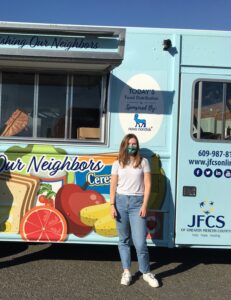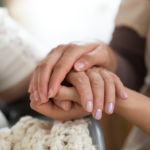We are so pleased to welcome Emmanuelle Farrell, Rutgers MSW student, to the agency for her first internship. She works with clients in Senior Services, Case Management and the Food Pantry and offers to help staff in any way she can. Despite these challenging times, she has already hit the ground running in the few months that she has been here.
Beverly Mishkin, LCSW, Director of Case Management & Senior Services
 Meet Emmanuelle!
Meet Emmanuelle!
My name is Emmanuelle Farrell, and I am interning at JFCS this year as part of my Master of Social Work program at Rutgers University. As a first-year graduate student, working at JFCS has offered me crucial experience with older adults and food insecure residents of Mercer County. As the COVID-19 pandemic has prevented many of my classmates from interning in person, I feel very grateful to be able to complete my internship in the JFCS office, where the few staff members working in-person wear masks and remain socially distant at all times. This direct approach has allowed me to see firsthand the significant impacts of the pandemic on the communities that JFCS serves.
The needs I have observed among the populations that JFCS provides services to appear to be exacerbated by financial, social, and health-related repercussions of the current pandemic. As I work primarily within the Senior Services department, I have noticed that older adults are in need of more than just basic necessities, like food and home health care. In making weekly check-in calls to Holocaust survivors and collecting seniors’ responses to program surveys, I have realized that many older adults are in dire need of companionship. This desire for social interaction has increased dramatically as the danger of contracting COVID-19 has stopped seniors from seeing family members and caregivers as frequently, if at all.
I also work with community members who reach out for assistance and help them get connected with our food pantry as a means of support.
I have also heard from other staff members that the demand for hunger prevention services has heightened significantly due to the widespread unemployment and subsequent economic difficulty associated with the pandemic. In general, the coronavirus pandemic has intensified the financial and interpersonal needs of vulnerable groups, increasing participation in JFCS’ programs and creating a unique learning environment for me as an intern.
There have been many connections between the content of my Master of Social Work courses and my experiences at JFCS. Primarily, I have been able to apply the communication skills I have learned in class to my interactions with clients, including empathetic listening and the use of furthering responses to encourage individuals to share. In addition, my work with the Holocaust survivors at JFCS has allowed me to implement a trauma-informed perspective, which I have learned about in my practice-focused classes. I greatly appreciate the opportunity to unite my academic setting with my fieldwork placement at JFCS.
Following the completion of my Master of Social Work degree, I hope to become a clinical social worker and administer therapy. Although I am interested in working with various populations, I intend to focus on serving trauma survivors through play therapy with children or cognitive behavioral therapy with adults. After becoming involved with JFCS, I have also gained an interest in working with older adults, particularly those who have endured trauma, such as survivors of the Holocaust. I plan to utilize many capabilities that I have developed as a JFCS intern in my future career, including performing intake procedures, researching program outcomes, and engaging compassionately with clients.
Although I have gathered many crucial sights throughout my time at JFCS, the most inspirational aspect of my internship has been the tangible difference that the organization makes in people’s daily lives. Every time I make a check-in call to an older adult, refer a new client to our food pantry, or assist with a distribution through the Mobile Food Pantry, I know I am making a meaningful change for an individual or family in need. I look forward to continuing my internship and furthering the agency’s incredible mission to empower individuals to care for themselves and others.
Emmanuelle Farrell, MSW Intern

 Meet Emmanuelle!
Meet Emmanuelle!

 To all Caregivers…
To all Caregivers… During the COVID-19 pandemic, many organizations, communities, and families have turned to Zoom as a way to connect virtually while remaining socially distant. But joining Zoom calls can be complicated and time-consuming, which discourages us from socializing with relatives and friends. These instructions can help you to join Zoom calls using a computer, a smartphone, or a regular cell phone so that you don’t miss out on virtual social gatherings.
During the COVID-19 pandemic, many organizations, communities, and families have turned to Zoom as a way to connect virtually while remaining socially distant. But joining Zoom calls can be complicated and time-consuming, which discourages us from socializing with relatives and friends. These instructions can help you to join Zoom calls using a computer, a smartphone, or a regular cell phone so that you don’t miss out on virtual social gatherings.


